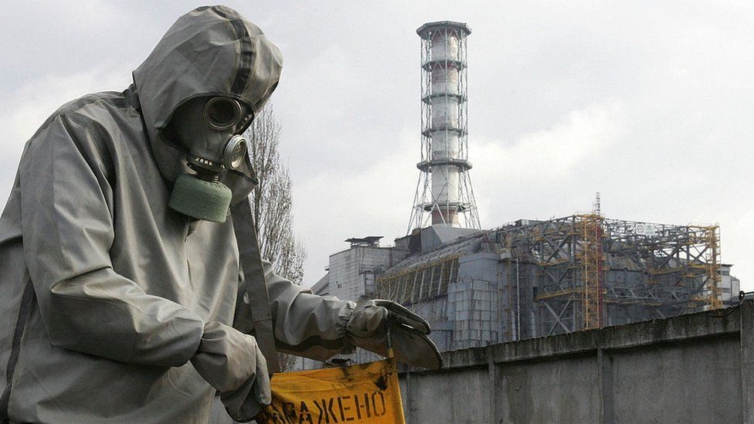Russian military forces have seized control of the Chernobyl nuclear power plant, Ukrainian officials say.
Presidential adviser Mykhailo Podoliak said the "totally pointless attack" on Thursday amounted to "one of the most serious threats in Europe today".
An explosion at Chernobyl in 1986 led to the worst nuclear disaster in human history, both in cost and casualty.
Ukraine's president warned such a disaster could happen again if Russia continued its invasion.
"Our defenders are giving their lives so that the tragedy of 1986 will not be repeated," President Volodymyr Zelensky wrote earlier on Twitter.
"This is a declaration of war against the whole of Europe."
The Ukrainian Ministry of Foreign Affairs has also warned of the possibility of "another ecological disaster" at the site.
Chernobyl's "exclusion zone" - a 32 km (19 mile) radius around the plant - remains largely devoid of life 36 years after a faulty reactor caused a major explosion at the plant.
The plant's three other reactors were all shut down by 2000 and it has since been decommissioned.
Radiation levels in the area remain dangerously high since the 1986 leak, chronicled in an eponymous HBO mini-series in 2019 that helped make the site a tourist attraction.
Russian troops reportedly entered the exclusion zone earlier on Thursday before crossing over into Ukraine.
The White House says it has received reports that staff are being held hostage at the site by Russian soldiers.
The forces are part of Russian President Vladimir Putin's "special military operation" in their neighbouring country.
Chernobyl is located about 130 km (80 miles) north of the capital Kyiv and could provide a path into the city for the invading forces.
Samantha Turner, a security fellow at the Truman National Security Project, says control of the area does not have "battle-determining significance" but gives Russian forces a corridor to the Dnipro River.
The river runs north into Belarus, whose president has closely aligned himself with Mr Putin, and south to Kyiv.
"It's an important part of them opening up different corridors for troop movement and controlling key terrain," she said.
She warned that, while nobody lives in the area and the plant is no longer active, any active fighting over the territory could cause radioactive waste spillage.
But Russians are among the world's most experienced nuclear operators, notes Claire Corkhill, a radioactive waste materials professor from the University of Sheffield.
She has worked as part of the international clean-up effort at Chernobyl for the past six years, even visiting the site three times.
The most significant success in these collaborations was the recent construction of a 32,000-tonne dome around the radioactive reactor, funded at a cost of $1.5b (£1.1b) by more than 30 countries.
Ms Corkhill now worries the invasion of Ukraine will effectively pause these operations.
"30 years have passed since the accident and we've still not cleaned everything up," she told the BBC. "It's easily another 50-year programme."
"If people aren't properly working on that facility, and progressing the decommissioning, it could be a really big problem."
The 1986 explosion is often linked to the eventual fall of the Soviet Union five years later.
Dr Taras Kuzio, research fellow at the Henry Jackson Society, says the seizure of Chernobyl is therefore best looked at as a symbolic win for President Putin.
"Putin has the mindset of somebody who cannot get over the fact the USSR disintegrated 30 years ago, and it all began to disintegrate after Chernobyl," Dr Kuzio, who is of Ukrainian descent, said.
He fears that, while Mr Putin may simply be using the threat of nuclear weaponry to ward off the West, he is operating like a "sociopath" and his actions should be watched closely.
"What he's doing in Ukraine is unprecedented. Why should we assume he is not going to do anything else?" he said.
Latest Stories
-
Incentive packages needed to tackle staff attrition in health sector – Parliament
1 minute -
Let’s give thanks to God for all things – Bawumia declares as he starts ‘Thank You Tour’ in Takoradi
2 minutes -
Ghanaians have lost the will to fight ‘galamsey’ – Barker-Vormawor laments
12 minutes -
MTN confirms hack; assures customers core systems remain secure
15 minutes -
GOC Elections: Evans Yeboah elected treasurer
28 minutes -
Threshold for petitioning to remove Chief Justice inadequate – Prof Agyeman-Duah
29 minutes -
GOC elects Richard Akpokavie as new president
31 minutes -
Photos: CAF President visits Mahama ahead of football championship finals
31 minutes -
The galamseyers’ regret: From digging gold to seeking forgiveness
37 minutes -
GOC Elections: Ghana Baseball President elected as 3rd veep
39 minutes -
Keta: Police destroy 24 bags of suspected cannabis
47 minutes -
Kurt Okraku appointed 2nd Vice President of CAF
53 minutes -
KSrelief centre provides clean water to Ghanaian communities
54 minutes -
ASFC 2025: Ghana boys come from behind to beat Uganda and clinch bronze
59 minutes -
GOC Elective Congress: GFA Gen Sec misses out on GOC Board
1 hour

